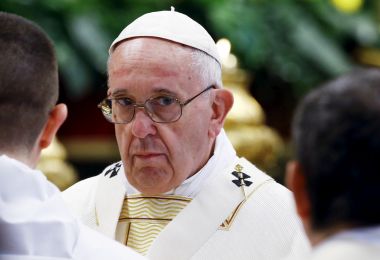Pope condemns paedophilia as details of girl's death shock Italy

Pope Francis called for "severe punishment" for paedophiles on Sunday after new details emerged in Italy of the 2014 death of a six-year-old girl who is alleged to have been thrown from an eighth-storey balcony by her abuser.
"This is a tragedy. We should not tolerate the abuse of minors," Francis said, departing from prepared remarks at his weekly Sunday message and blessing to tens of thousands of people in St. Peter's Square.
"We must protect minors and severely punish abusers," he said.
Though the Catholic Church itself has been rocked by its own abuse scandals, he did not mention them on Sunday as he has in the past.
Italians have been shocked as details emerged in the case of six-year-old Fortuna who died in June 2014 after a fall from an eighth-storey balcony in Naples.
After re-opening the case, police charged a 43-year-old man with having thrown the girl to her death in a housing block in a rough area of the city after raping her. Police said they suspected he killed her so she would not talk.
The man, who has also been accused of molesting other children and is now in prison in Rome, has denied the charges.
On Saturday Italian President Sergio Mattarella called for an "ample, rapid and severe" judicial process concerning the case, which has dominated newspapers' front pages for days.
Child abuse by priests has plagued the Roman Catholic Church itself for decades.
While some cases of sexual abuse in the Church were exposed piecemeal, such as in the U.S. state of Louisiana in the 1980s, the scandal exploded in 2002, when it was discovered that U.S. bishops in the Boston area moved abusers from parish to parish instead of defrocking them.
Similar scandals have since been discovered around the world and tens of millions of dollars have been paid in compensation.
While the pope has vowed "zero tolerance" for abusers in the Church, victims groups have accused him of not doing enough. They say he should do much more to make bishops more accountable for covering up abuse or not preventing it.
A commission he set up to advise him on how to root out abuse in the Church has struggled to find its stride.
In February, Peter Saunders of Britain, a prominent and outspoken member, stepped down in protest.
In March, Cardinal George Pell, under fire for his handling of sexual abuse of children by priests in Australia decades ago, gave four days of evidence to an Australian government commission, which again put the Church's problem with abuse on the world stage.











